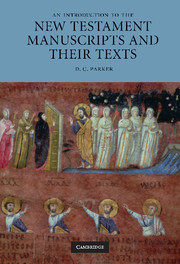Book contents
- Frontmatter
- Contents
- List of plates
- Links to URLs
- Acknowledgements
- List of abbreviations
- Introduction
- PART I THE DOCUMENTS
- PART II TEXTUAL CRITICISM AND EDITIONS
- PART III THE SECTIONS OF THE NEW TESTAMENT
- 7 The Book of Revelation
- 8 Paul
- 9 Acts and the Catholic epistles
- 10 The Gospels
- 11 Final thoughts
- Glossary
- Index of manuscripts
- Index of biblical citations
- Index of names and subjects
8 - Paul
Published online by Cambridge University Press: 05 June 2012
- Frontmatter
- Contents
- List of plates
- Links to URLs
- Acknowledgements
- List of abbreviations
- Introduction
- PART I THE DOCUMENTS
- PART II TEXTUAL CRITICISM AND EDITIONS
- PART III THE SECTIONS OF THE NEW TESTAMENT
- 7 The Book of Revelation
- 8 Paul
- 9 Acts and the Catholic epistles
- 10 The Gospels
- 11 Final thoughts
- Glossary
- Index of manuscripts
- Index of biblical citations
- Index of names and subjects
Summary
INTRODUCTION
The textual criticism of the Pauline corpus, as this letter-collection is generally called, is inseparable from questions of the development and transmission of the collection. The key research questions are the following:
(1) What are the origins of the process of collection?
(2) Do they begin with Paul himself?
(3) How many collections were there in the second century?
(4) What is the relationship between the text of the letters as they are found in the collections and the text of the letters as they circulated independently?
(5) What light does a study of the role of Paul's amanuenses cast on the early history of his letters?
It is not hard to see ways in which these questions are relevant to other matters in the study of Paul's letters. The questions surrounding the formation of the corpus necessarily concern the relationship between the genuine and the deutero-Pauline letters. But to treat them as identical issues would be to assume that our interests and those of the ancients were identical. The fact that Hebrews, a letter which today is universally agreed not to be by Paul, appears in some collections at quite an early date, is a warning against doing so. Another topic of importance to all is the study of the possible role of Paul in the formation of the collection, with the attendant possibility that he was responsible for revision of the text of the letters.
- Type
- Chapter
- Information
- An Introduction to the New Testament Manuscripts and their Texts , pp. 246 - 282Publisher: Cambridge University PressPrint publication year: 2008



